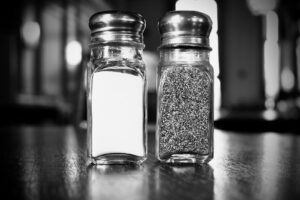
How to Say Something Is Free in English
The word “free” usually gets people’s attention quickly! But do you know how to say that something is free using...


How to Use "Play" Like a Native Speaker


How to Talk About Hot Weather in English


Topic Focus: Super English Words


Everyday English Abbreviations You Should Know


What Does "Stuff" Mean and How Do You Use It?
If you listen to native English speakers, you'll probably hear “stuff” often. But what does it mean and why is...


What Do 2025's English Words of the Year Mean?
Each year, famous dictionaries like Oxford and Cambridge choose a word they feel represents the mood or major events of...



Collocations: Word Pairs for Natural English
"Quick food"? "Do a test"? "White and black"? Do these phrases sound strange to you? If they do, then you...


How to Use "Help" Like a Native Speaker
"Help" is a basic but important word most English students learn early in their studies. But aside from its basic...


How to Say Something Is Free in English
The word “free” usually gets people’s attention quickly! But do you know how to say that something is free using...


How to Use "Taste" Like a Native Speaker
You probably know the meaning of "taste" as a verb is "to experience the flavor of something." But that's only...



The Ultimate Guide to Using "Can" and "Be Able To"
Though similar, "can" and "be able to" are different in three important ways: This post will explain each of these...


How to Use "Play" Like a Native Speaker
In English, simple words are often the most useful, and "play" is a great example. It's common when talking about...
!["How Far" and "How Long": What's the Difference? [Updated] "How Far" and "How Long": What's the Difference? [Updated]](https://assets.blog.engoo.com/wp-content/uploads/sites/9/2022/05/10083515/how_far_long_difference-300x200.jpg)
!["How Far" and "How Long": What's the Difference? [Updated] "How Far" and "How Long": What's the Difference? [Updated]](https://assets.blog.engoo.com/wp-content/uploads/sites/9/2022/05/10083515/how_far_long_difference-300x200.jpg)
!["How Far" and "How Long": What's the Difference? [Updated] "How Far" and "How Long": What's the Difference? [Updated]](https://assets.blog.engoo.com/wp-content/uploads/sites/9/2022/05/10083515/how_far_long_difference-300x200.jpg)
"How Far" and "How Long": What's the Difference? [Updated]
"How far" and "how long" may sound the same to many English learners, but each has a specific meaning and...


How to Talk About Hot Weather in English
"It's hot!" You can use this simple phrase to describe the weather when the temperature goes up in the summertime....
!["How Far" and "How Long": What's the Difference? [Updated] "How Far" and "How Long": What's the Difference? [Updated]](https://assets.blog.engoo.com/wp-content/uploads/sites/9/2022/05/10083515/how_far_long_difference-300x200.jpg)
!["How Far" and "How Long": What's the Difference? [Updated] "How Far" and "How Long": What's the Difference? [Updated]](https://assets.blog.engoo.com/wp-content/uploads/sites/9/2022/05/10083515/how_far_long_difference-300x200.jpg)
!["How Far" and "How Long": What's the Difference? [Updated] "How Far" and "How Long": What's the Difference? [Updated]](https://assets.blog.engoo.com/wp-content/uploads/sites/9/2022/05/10083515/how_far_long_difference-300x200.jpg)
"How Far" and "How Long": What's the Difference? [Updated]
"How far" and "how long" may sound the same to many English learners, but each has a specific meaning and...
![The Many Meanings and Uses of X [Updated] The Many Meanings and Uses of X [Updated]](https://assets.blog.engoo.com/wp-content/uploads/sites/9/2023/08/22034748/meanings_and_uses_of_x-300x200.jpg)
![The Many Meanings and Uses of X [Updated] The Many Meanings and Uses of X [Updated]](https://assets.blog.engoo.com/wp-content/uploads/sites/9/2023/08/22034748/meanings_and_uses_of_x-300x200.jpg)
The Many Meanings and Uses of X [Updated]
X is one of the most powerful letters in the alphabet. From math to maps, and from voting to kissing,...



The Ultimate Guide to Using "Can" and "Be Able To"
Though similar, "can" and "be able to" are different in three important ways: This post will explain each of these...


"What's Up?": How to Use It and Respond to It
"What's up?" If you have English-speaking friends or watch English TV and movies, you've probably heard this expression before. Even...


Why Native English Speakers Say "Have" When They Mean "Eat"
Has a waiter ever asked you “What will you have to drink?” Or have you ever heard a native English...
!["Used To" / "Be Used To" / "Get Used To": What's the Difference? [Updated] "Used To" / "Be Used To" / "Get Used To": What's the Difference? [Updated]](https://assets.blog.engoo.com/wp-content/uploads/sites/9/2023/05/02080148/used_to_cover-300x192.jpg)
!["Used To" / "Be Used To" / "Get Used To": What's the Difference? [Updated] "Used To" / "Be Used To" / "Get Used To": What's the Difference? [Updated]](https://assets.blog.engoo.com/wp-content/uploads/sites/9/2023/05/02080148/used_to_cover-300x192.jpg)
"Used To" / "Be Used To" / "Get Used To": What's the Difference? [Updated]
By itself, "use" means "to put into action for a specific purpose." But when you add "to," it becomes a...



Collocations: Word Pairs for Natural English
"Quick food"? "Do a test"? "White and black"? Do these phrases sound strange to you? If they do, then you...


How to Use "You Know" Like a Native Speaker
If you watch English-language TV or listen to native speakers in a casual conversation, one thing you will definitely hear...


How to Use "Enough" Like a Native Speaker
"Enough" is used often in daily conversations, so understanding its different forms will give your English fluency a big boost....


"Me Too" and "Neither Do I" - A Quick Guide to Agreements
Many English learners know that "me too" is a simple and easy way to agree with someone. However, they may...
